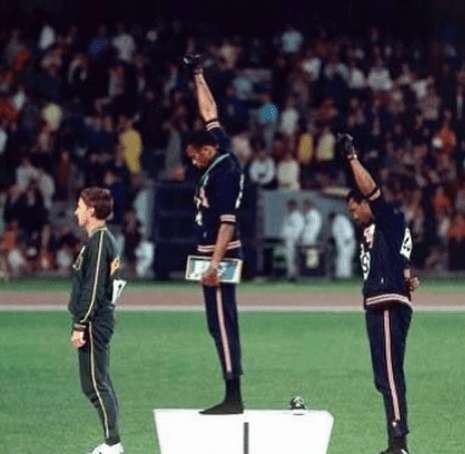Peter Norman: unsung hero of the 1968 Olympic protest
The Australian sprinter stood in solidarity with Tommie Smith and John Carlos at the Olympics in Mexico City

It’s been more than 50 years since American sprinters Tommie Smith and John Carlos won gold and bronze medals in the 200m at the 1968 Olympics in Mexico City. On the podium after the race, the two Black men stood with their heads bowed and fists gloved and raised to peacefully protest racial inequality back home. The third man on that podium was silver medallist Peter Norman of Australia, and although he is often forgotten or overlooked, he took a stand that day in Mexico City, too, silently supporting his fellow medallists.
https://www.instagram.com/p/CA56pjqDw5u/?utm_source=ig_web_copy_link
Standing together
Norman had the run of his life in the Olympic final, posting a 20.06-second 200m — a time that still stands as an Australian record to this day — to win the silver medal behind Smith, who set a world record of 19.83 to capture the gold. Ahead of the medal ceremony, Carlos and Smith explained their podium plans to Norman.
RELATED: IOC maintains stance against protests during the Olympics
“We knew that what we were going to do was far greater than any athletic feat, and [Norman] said, ‘I’ll stand with you,’” Carlos recalled, as reported by The Wire. “I expected to see fear in Norman’s eyes, but instead we saw love.” The two American athletes had decided to mount the podium with only socks on their feet to symbolize the poverty that plagued Black communities across the U.S., and they wore black gloves (one each, which Norman suggested they do) on the hands they planned to raise during the national anthem. Finally, they had badges from the Olympic Project for Human Rights, which was a group of athletes supporting the fight for equality. Norman wore a badge as well.
Today I learned…
The white man in this photo was Peter Norman from Australia who finished 2nd the 1968 200m final. Norman stood in solidarity with the American Black athletes. It was Norman who suggested, when discovered they only had 1 pair of gloves, to each wear one. (cont) pic.twitter.com/XjYOM8xe9D
— Ciarán the Masked Shadow Sorcerer (@notagain127) June 13, 2020
Years later, Norman spoke about their time on the podium, saying he “couldn’t see what was happening, [but] I had known they had gone through with their plans when a voice in the crowd sang the American anthem but then faded to nothing. The stadium went quiet.”
RELATED: Video of runner Ahmaud Arbery’s murder in Georgia sparks outrage
Last Olympics
Carlos, Smith and Norman never competed in another Olympics. Four years later, Norman qualified for the 1972 Games in Germany in both the 200m and 100m, but he was left off the Australian team.
In the years that followed the 1968 Olympics, Norman was publicly ostracized and vilified for standing alongside Carlos and Smith in Mexico City, and he struggled to find a steady job because of it. He was given several chances to save his own reputation by condemning Carlos and Smith for their actions on the podium, but he never did. In a 2008 documentary titled Salute (directed and produced by Norman’s nephew), he spoke about that moment in 1968.
RELATED: Commonwealth Games to allow peaceful athlete protests
“I couldn’t see why a black man couldn’t drink the same water from a water fountain, take the same bus or go to the same school as a white man,” he said. “There was a social injustice that I couldn’t do anything for from where I was, but I certainly hated it. It has been said that sharing my silver medal with that incident on the victory dais detracted from my performance. On the contrary. I have to confess, I was rather proud to be part of it.”
John Carlos turns 75 today. That podium moment in 1968, narrated by Serena Williams. pic.twitter.com/1hOvlgiha3
— Nick Zaccardi (@nzaccardi) June 5, 2020
It wasn’t until 2012 — six years after Norman passed away from a heart attack — when the Australian government formally apologized to the greatest sprinter in the country’s history, acknowledging the “bravery of Peter Norman in donning an Olympic Project for Human Rights badge on the podium in solidarity with African-American athletes Tommie Smith and John Carlos.”
Carlos, Smith and Norman remained friends for the rest of Norman’s life, and when he passed away, the two Americans were pallbearers at his funeral.

